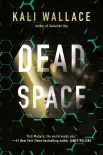Dead Space Kali Wallace (best non fiction books to read txt) 📖

- Author: Kali Wallace
Book online «Dead Space Kali Wallace (best non fiction books to read txt) 📖». Author Kali Wallace
“Take a minute,” Adisa said.
He walked away, footsteps withdrawing into the warehouse, and I was alone.
It took three times, three times telling myself to just ratfucking do it, to grow a bloody spine, to get the fuck over it, three times before I was able to turn around. I could take a minute, but it wasn’t going to help. I could take an hour, a day, a whole accursed year, and it wouldn’t help. There was no exercise in counting to ten or breathing deeply or soothing my nerves that would put me anywhere other than in space, on a lifeless rock in the outer system, in the room where David had died.
I made myself move. Not out of the airlock, but across it, toward the outer hatch. I stepped over the dark stain of David’s blood and felt a suffocating rush of helplessness and aching, bitter sadness.
There was a window on the outer hatch, about twenty centimeters tall, hexagonal in shape, and a small slot beside the door for an emergency physical override, lest anybody be caught on the wrong side of depressurization. It was such a clumsy and old-fashioned gesture toward safety. The entire hatch was a bulky old unit obviously repurposed from the defunct UEN base; the door had been built to withstand Martian missiles or worse. It had kept the vacuum outside for more than thirty years. It wasn’t going to snap open or crumple outward or vanish or any of the innumerable, impossible failures I could imagine, and did imagine, far too easily, every time there was only a single door between me and open space. The United Earth Navy loved its hexagon symbolism: one strong side for each of the six superpowers that had joined together to fight for Earth and crush the Martian rebellion. To keep the solar system safe from chaos. To show the upstarts who was boss. That level of ostentatious militarism had fallen out of fashion after the armistice, although crushing upstart Martians never really went out of style. The disarmament treaty and system-wide weapons test monitoring meant there wasn’t any military weaponry or infrastructure within a million kilometers of Nimue, not anymore, not since the UEN had decommissioned the base. Only the geometry of the war remained firmly stamped on the ruins left behind, even out here, so far from Earth and Mars.
I was still making a fist. Still doing it without thinking. Left hand, metal hand. I took a breath and forced myself to relax. Brain, nerves, muscles. Signal and response. If I clenched that one too tightly, too often, without letting the joints open, the delicate engineering and responsive alloy that made up the phalanges and metacarpals would stiffen and glitch. It didn’t hurt, exactly, because my prosthetic parts couldn’t feel pain, but it was awkward as fuck when I tried to grasp something and my hand responded like a squeaky set of gears on an old bicycle. I dropped things. People stared. Everybody felt embarrassed for me.
I had to take a breath before I could look through the window. Two breaths. My throat was tight.
The view surprised me. I had somehow expected—even knowing that the airlock floor was oriented toward Nimue’s center—that the airlock would open to space, and all that I would see would be stars and darkness. That was the view that haunted all my nightmares: the stars, the nothingness, and fuck you very much, doctors, for telling me how irrational it was.
But what I saw outside that window was Nimue’s gray and pockmarked surface, sweeping out toward a startlingly close horizon. A line of old transport rails, probably unused since the UEN days, led away from the hatch. The curvature of the asteroid made the rails look as though they ended abruptly only tens of meters away, like a diving board into nothingness, but for all I knew they could wrap all the way around Nimue’s lumpy, elongated body.
“What the hell did you get into out here, David?” I said quietly.
On the flight over, I had watched countless press reports and interviews with Parthenope execs in which they extolled Nimue’s many profitable virtues; analyses from outer systems economists who said the company was betting its entire existence and the fortunes of a great many very powerful investors on the success of Nimue; projections questioning whether consolidation of ore-processing and fuel-manufacturing facilities was going to be more effective in future asteroid mining than the current distributed model; and many, many, far too many quarterly reports in which Parthenope proudly enumerated the ways in which Nimue was exceeding expectations when it came to productivity and efficiency.
Nimue was important to Parthenope Enterprises. It was no secret that their long-term plan was to absolutely dominate this bleak corner of the belt. Water for everyone. Fuel for everyone. Rare metals for everyone. Opportunity for everyone—provided they could pay for it.
Sigrah wanted David’s murder to be personal. The company wanted it to be personal. Mining crews got into personal altercations all the time. They were a discontented, easily agitated group of people. A disagreement over something petty. Drugs or sex or money. Tempers flaring. One furious blow that turned into dozens. It wasn’t a stretch. It was what everybody wanted to believe.
There was a small sound behind me, a choked little gasp. I spun around, heart racing, to find a young woman standing in the doorway. Her shimmery silver hair was so bright it provided a disorienting contrast to the grim warehouse behind her. She had one hand pressed to her lips. Tears shone





Comments (0)